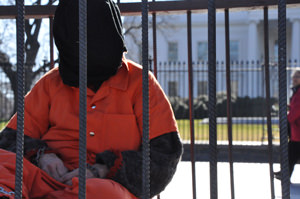U.S. Stops Daily Updates on Gitmo Strike
The number of inmates on a hunger strike at Guantanamo Bay has dropped from a hundred to 19 since July.
The number of inmates on a hunger strike at Guantanamo Bay has dropped from a hundred to 19 since July. Now that the latter number has remained steady for two weeks, the U.S. military has decided to put an end to its habitual tally, explaining that these last few strikers “represent those who wish to continue to strike.”
Al-Jazeera reports the various reasons why many Gitmo prisoners have ended their protest:
Pardiss Kebriari, senior attorney at the Center for Constitutional Rights, told Al Jazeera that the strikers who “suspended” their strikes did so for a variety of reasons. “For some,” she said, “they feel their protest was heard to some extent, and they’ve been heartened by the international response.”
She said for other prisoners, however, the camp administration’s brutal pressure tactics during the strike played a role. The U.S. military “made being taken out of solitary confinement contingent on men ending their strike,” she said.
Eighteen of the remaining strikers are on the “enteral feed list,” meaning they can be strapped down and fed a liquid nutrient mix through a nasal tube. According to the military’s latest tally, no hunger striking inmates are being observed at a base hospital.
Kebriari told Al Jazeera that force-feedings continue including for the purpose of forcing men to receive medical treatment. The U.N.’s Office of the High Commissioner for Human Rights in May referred to the force-feedings as “cruel, inhuman and degrading treatment.”
Although a small group of prisoners have been on long-term hunger strike since 2007, the number of striking inmates spiked in February in response to what lawyers said was mishandling of Qurans by guards. By April, more than half of the prisoners at Guantanamo Bay had joined the strike to draw attention to their indefinite detention and treatment.
Despite the intense suffering these detainees have endured through force-feeding and other mistreatments, many believe that their strike has been effective in that it has brought Gitmo back into the international spotlight and forced President Obama to consider his vow to close it. This has given many people hope that Obama will keep his word, but, as human rights attorney David Remes said, “Whether that hope is justified remains to be seen.”
—Posted by Natasha Hakimi
Your support matters…Independent journalism is under threat and overshadowed by heavily funded mainstream media.
You can help level the playing field. Become a member.
Your tax-deductible contribution keeps us digging beneath the headlines to give you thought-provoking, investigative reporting and analysis that unearths what's really happening- without compromise.
Give today to support our courageous, independent journalists.






You need to be a supporter to comment.
There are currently no responses to this article.
Be the first to respond.